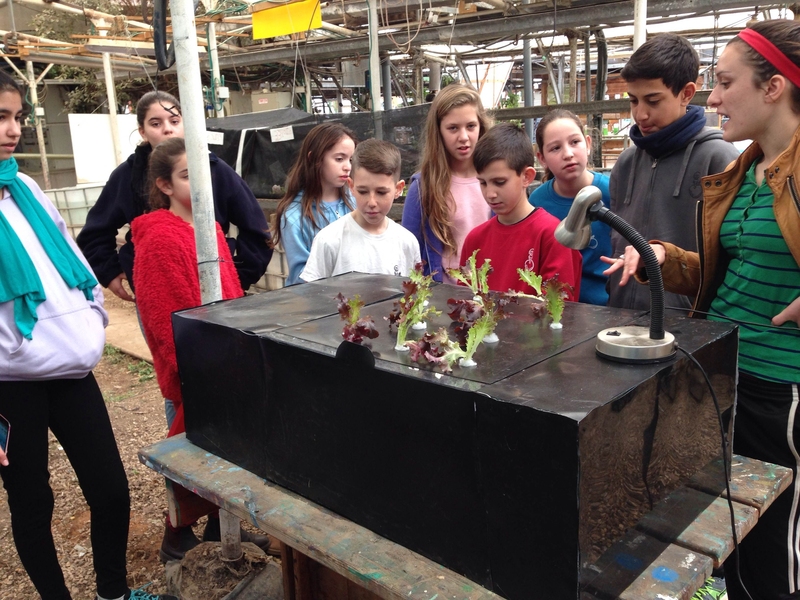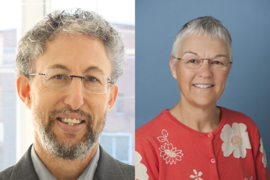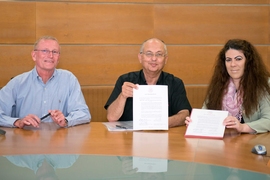Formally incepted in 2007, the MIT-Israel Program recruits, selects, and places qualified and motivated MIT students in internships across Israel — a country marked by innovation, entrepreneurship, and cutting-edge research as well as rich cultural history.
MIT-Israel has grown in numbers and in its scope activities: from 15 students in the summer of 2008 to 60 students this academic year; from industry and research internships to the addition of teaching opportunities, and experiences at nonprofits and startups; from abbreviated spring training to a six-month global competency educational process. MIT-Israel has also launched two MISTI Global Seed Funds and has collaborated with MIT academic departments to incorporate Israel into the classroom. The MIT-Israel Program, now integrated across the Institute, looks forward to future growth.
In just eight years, the MIT-Israel Program has grown tremendously in terms of student numbers, program activities, and faculty opportunities. When asked “Why Israel?” three-time program participant Camille Richman '15 explained: “I gained a wider and more empathetic world view and appreciation of other perspectives and cultures. I was able to explore fields outside mechanical engineering, and I was able to find what kind of work really clicked with me by exploring several different work settings — industry, research, and non-profit/education.”
Launch of the MIT-Israel Seed Fund
This year MIT-Israel launched the MIT-Israel Seed Fund as part of the MIT International Science and Technology Initiatives (MISTI) Global Seed Funds program. The program supports new collaborations between faculty and research scientists at MIT and their counterparts in Israel. Thirty-five grant applications were received from 17 MIT departments and 10 Israeli academic institutions, and six faculty projects were awarded with over $148,000 in funding. Winning proposals will undertake diverse projects ranging from hydropower to STEM education to the theory and practice of pseudo-random functions.
The MIT-Israel Seed Fund joins the MIT-Israel – Ben-Gurion University of the Negev Seed Fund, which supports new collaboration between faculty and research scientists at MIT and their academic counterparts at the Ben-Gurion University of the Negev.
Bringing Israel into the classroom … and the classroom to Israel
Building on the Seed Funds and other academic initiatives, MIT students have found an increasing number of opportunities to holistically incorporate Israel into their coursework. Following a semester of hands-on Israel-related learning at MIT, students actually travel there to more fully immerse themselves in the topics they studied in the classroom.
Most recently, students in MIT Professor Alexander Slocum’s course 2.752 / 2.753 (Development of Mechanical Products) will learn about Israel’s and the region’s specific water challenges and opportunities. They will propose solutions under Slocum’s guidance. His Seed Fund proposal, “Advanced Pumped Hydropower Reverse Osmosis System to Provide Power and Desalinated Water to the Aqaba-Eilat Region of the Red Sea” was s awarded the MIT-Israel Seed Fund grant in collaboration with Professor Jacob Karni of the Weizmann Institute of Science in Rehovot, Israel. Most of the students in the course will travel to Israel in March, and again in the summer for firsthand exposure to Israel’s water situation.
Slocum’s course builds on the success of the MIT School of Architecture and Planning integration of students into the 2012 Seed Fund project which, under the direction of MIT Professor Eran Ben-Joseph and Tel Aviv University Professor Tali Hatuka, sought to transform the Israeli city of Kiryat Gat into a laboratory for updating the city planning. Students were able to travel to Israel for 10 days to undertake the challenge after their semester-long studio course.
This year also saw the launch of the MIT Sloan Israel Lab in collaboration with MIT Sloan Action Learning Labs, co-taught by Christine Ortiz, dean for graduate education and faculty director of the MIT-Israel program, and Jacob Cohen, senior associate dean for undergraduate and master's programs at the MIT Sloan School of Management. Through this initiative, MIT Sloan students learn about Israel and its unique entrepreneurial ecosystem on campus. The MIT Sloan teams work remotely from the Institute during the fall semester, partnering with Israeli host organizations before travelling to Israel in January to work on-site with their hosts. The teams address complex problems in critical areas, including high-tech, biotechnology, clean technology, and communications with an emphasis on early stage ventures and their growth. Varied topics were tackled this year, such as competitor analysis, pricing, and go-to-market strategies.
MIT-Israel is in conversations with other MIT faculty to launch additional classes following these models. The courses will enable students to learn about Israel and its unique entrepreneurial and scientific communities, take part in in-country Israel experiences, while creating hands-on learning experiences integral to students’ course of study.
Internships, Global Teaching Labs, and beyond
Since its launch in 2008, MIT-Israel has sent over 485 students to Israel for fully-funded industry and research internships year-round, and to teach self-designed Entrepreneurship and Leadership Seminars and STEM subjects to high schoolers across Israel in partnership with the ORT/Israel Sci-Tech Network, the Amal Network and The Ecological Greenhouse at Kibbutz Ein-Shemer during MIT's Independent Activities Period as part of the Global Teaching Labs (GTL) program.
With over 500 hosts in Israel, the internships and research undertaken by students has been as diverse as it has been enriching for both students and hosts. MISTI projects have included testing the feasibility of new ventilation techniques for hospital patients under the director of emergency medicine at the Tel Aviv Sourasky Medical Center; co-authoring articles about learning robots; researching new genetic cancer markers; creating new mobile features for cybersecurity companies; conducting comparative research at the Research and Information Center at the Knesset (Israeli Parliament); installing solar panel arrays, and hundreds of other significant projects. Past student profiles can be viewed on the MISTI website.
Through MIT-Israel’s teaching and internship programs, Camille Richman '15 was given the opportunity to intern at Keter Plastic where she designed a semi-automated table for packaging small parts to create a more comfortable environment for elderly factory workers. During her MISTI 2.0 and GTL experiences, she taught month-long classes in aeroponic farming to middle and high school students. Says Richman, “The program allowed me to study languages, travel, and gain work experience all at the same time.” Since leaving the Institute in 2015, Richman is, “still farming, still teaching, and [will be] manufacturing desktop controlled environment farms for schools” at the MIT Media Lab.
Israel Security Seminar
After 2015’s successful pilot of the spring break Israel Security Seminar, MIT-Israel is excited to once again send ROTC students from MIT to Israel. The itinerary includes both key sites (Jerusalem, the Holocaust museum Yad Vashem, and Masada) as well as experiences unique to this trip, such as "mifgashim" ("encounters") with current and former Israel Defense Force soldiers, special visits to high-tech companies, panels about current events and geopolitics, and visits to military bases.
Rooted in pre-trip training sessions and their in-country experiences, students will gain new perspectives on Israeli and military service, leadership styles, the U.S.-Israel security relationship, and civilian-military integration. Reflecting on her 2015 experience, Bridget McCoy '15 wrote: “[The trip] definitely made me think outside the box about leadership, and reflect on how I can adapt my leadership style if necessary. … It has been a good exercise for me to analyze both [Israeli and U.S. models].
MIT-Israel is one of 19 country programs at MISTI, a program in the School of Humanities, Arts, and Social Sciences (SHASS). MISTI supports MIT’s educational mission by creating hands-on, international learning experiences for MIT students that are related to their course of study. The program bolsters the Institute’s research mission by promoting collaborations between MIT faculty members and their counterparts abroad, and advances MIT's outreach efforts through our partnerships with foreign companies, universities and research institutions, especially those that serve as hosts for students and faculty.








